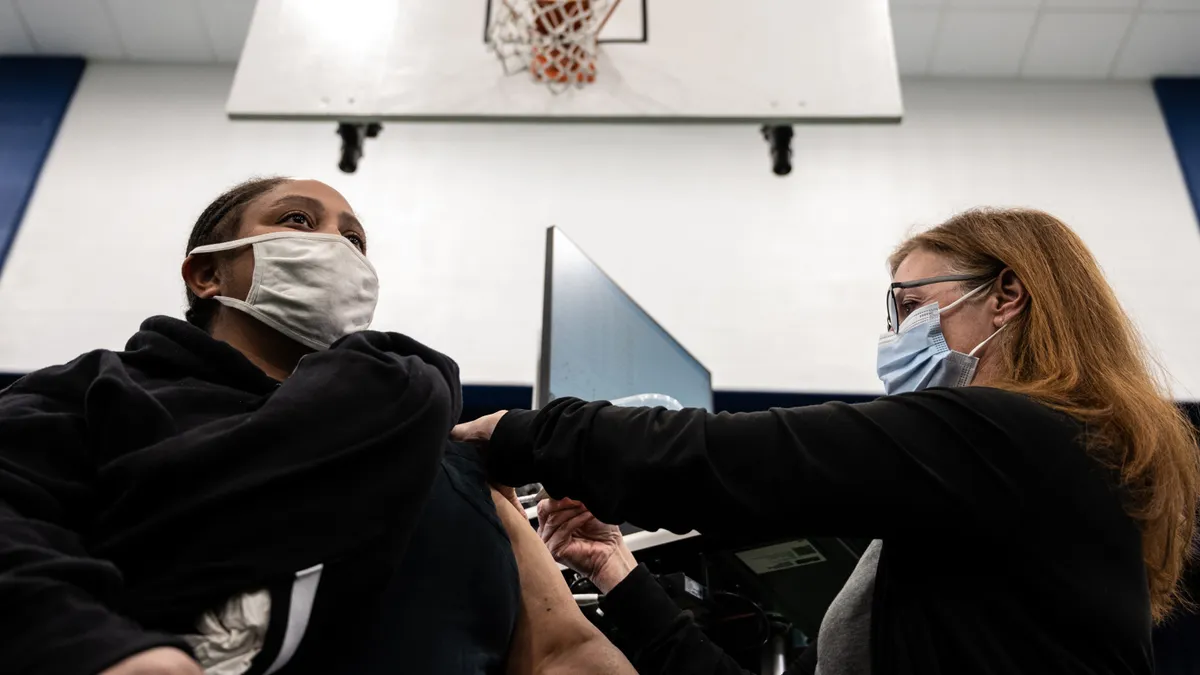Since the roll-out of the first vaccines to essential workers in the second half of 2020, U.S. employers and their legal representatives awaited guidance on whether federal equal employment opportunity laws would permit them to require employees to get vaccinated against COVID-19.
Shortly before Memorial Day weekend, the U.S. Equal Employment Opportunity Commission published an update to its existing technical assistance questions and answers webpage. In short: employers can implement policies requiring that all of their employees physically entering the workplace be vaccinated for COVID-19. But these policies also must take into account the reasonable accommodation provisions of the Americans with Disabilities Act, Title VII of the Civil Rights Act of 1964 and other applicable EEO, state and local laws.
Though the document spells out much of the EEOC's response to key questions about vaccine policies, employers may have other considerations to ponder. HR Dive spoke with two management-side attorneys to determine what employers can take away from the update.
#1: What does a reasonable accommodation for a vaccine policy look like?
EEOC stated in its document that an employee who does not get vaccinated due to a disability or a sincerely held religious belief, practice, or observance may be entitled to a reasonable accommodation that does not pose an undue hardship on the operation of the employer's business.
Employers that employ such workers may look to health and safety practices that have been common practice since long before vaccines were available for COVID-19, said Adam Sencenbaugh, partner at Haynes and Boone. That could include policies requiring unvaccinated employees to wear a mask when entering the workplace, socially distance from co-workers or non-employees, work a modified shift or telework, among other options.
EEOC also said employees who choose not to be vaccinated because of a pregnancy may be entitled to adjustments — such as telework or changes to work schedules or assignments — that allow them to keep working. A pregnant employee also may be entitled to "leave to the extent such modifications are provided for other employees who are similar in their ability or inability to work," per the document.
Employers also may need to be prepared to accommodate employees who, despite having received a COVID-19 vaccine, may still be immunocompromised, Sencenbaugh said. But overall, many employers "have a built-in familiarity" with handling accommodation requests during the pandemic.
#2: How does CDC mask guidance square with medical information rules?
One potentially trickier aspect of the EEOC's technical assistance has to do with the agency's determination that the ADA requires an employer to maintain the confidentiality of an employee's documentation or other confirmation that they have received a COVID-19 vaccine.
That is because the Centers for Disease Control and Prevention has announced that fully vaccinated individuals may resume pre-pandemic activities without wearing a mask or physically distancing — except where required by federal, state, local, tribal, or territorial laws, rules, and regulations, including local business and workplace guidance.
According to Alana Genderson, associate at Morgan Lewis, a common question from employers concerns how they can ensure confidentiality about workers' vaccination status while also permitting those who have been vaccinated to enter the workplace without wearing masks.
"The practical reality is that people are going to know who's vaccinated and who's not," Genderson said. She noted that employers may decide to build into their policies language that would allow employees to wear masks regardless of their vaccination status, if they choose to do so; "That way it's not as cut and dry."
Still, employers may struggle to determine the correct balance on mask policies, said Sencenbaugh, who noted that some employees may opt to continue wearing masks due to their effectiveness in preventing diseases other than COVID-19, such as the flu. But once CDC guidance and state and local orders around masks begin to fade, that could lead to further divides among worker populations, he added.
"I don't know that it would cause legal problems for employers, but it could impact morale or other things in different ways," Sencenbaugh said.
#3: What types of incentives might employers consider?
EEOC's guidance on vaccine incentives includes a limit directed at employers incentivizing shots "administered by the employer or its agent."
Employers in such situations may offer an incentive to employees. Under the ADA, however, any such incentive may not be "so substantial as to be coercive," the agency said.
Other employers "are largely not going to be impacted" by this section of the EEOC's technical assistance on vaccine incentives, Genderson said.
Sencenbaugh said he has seen several creative forms of incentives from clients, ranging from paid time off to raffles. That mirrors reports of what other employers have done to incentivize vaccination, with ideas including direct payments and transportation provided to those receiving a vaccine.
"We have yet to have a client ask us about a program that would be coercive in that respect," Sencenbaugh added. "It's been something that, if done appropriately, can even boost morale."























